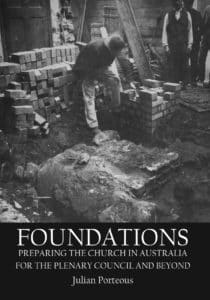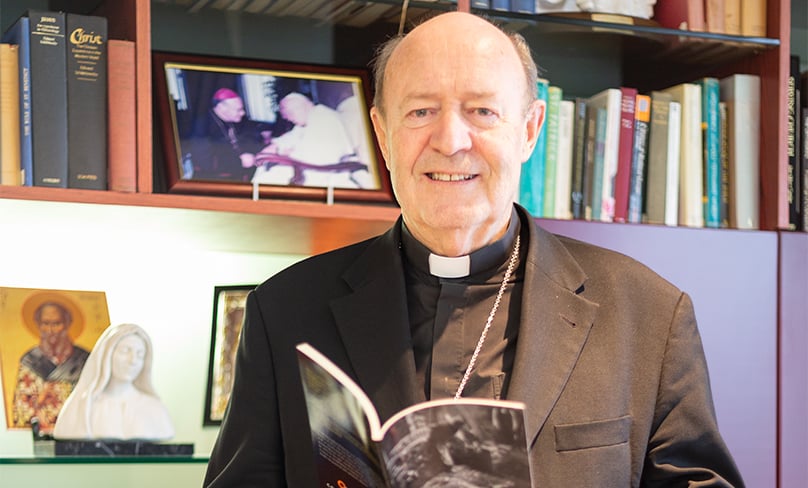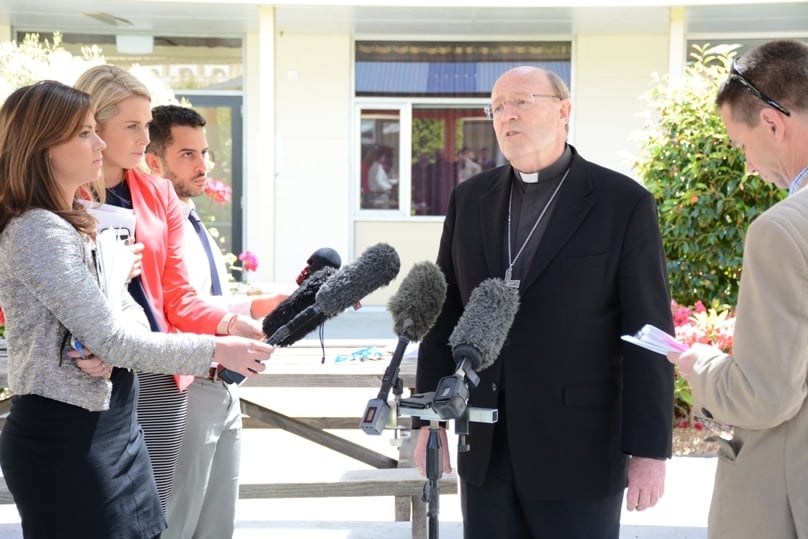
In his pared-back but very timely new book, Foundations: Preparing the Church in Australia for the Plenary Council and Beyond, Archbishop Julian Porteous of Hobart brings his life-long and very personal involvement in evangelisation and “missionary” formation to bear upon the non-negotiable building blocks of Catholic life and belief.
The book’s subject, the Plenary Council of the Church in Australia will commence this weekend.
It is just the fifth in the history of this country and the first to be held since 1937.
In his preface, Cardinal George Pell captures the immediacy of the book’s subject, writing: “As Catholics we are Gospel Christians, who believe the last word on any doctrine of faith and morals has to be rooted in the Apostolic Tradition …” rather than falling prey to the fashionable, the transient or facile interpretations of this Tradition.

In an interview with The Catholic Weekly, Archbishop Porteous expressed a gentle but fervent hope that each of the nine short chapters of his book will spark a deeper and more keenly Christ-centred discernment by the bishops, members and others attending the Plenary.
He hoped that the book would spark some imaginative and lively discussion among all the committed Catholics who may sense (incorrectly he thinks) that they are only by-standers to the fate of the Church in Australia.
“Over the last two years and beyond I have been conscious of the issues that have emerged during the various listening and other processes leading up to the Plenary,” he said.
“So many Australian Catholics were touched in some way by the listening process but I think that although the rest of the Plenary may now seem distant to them, the issues in the book will interest them as well.”
While the book begins with two chapters in which the Archbishop provides a snapshot of the many cultural factors, obstacles and misunderstandings Catholicism encounters in our times, it sets out the impressive “legacy” the Church has left on the Australian landscape.
Later chapters explore the ways in which “intentional discipleship” can renew both Catholic and Australian lives.

“I hope that the book also clears the way to a path forward – to identify some of the important matters we need to face for the future,” he said.
In his chapter ‘Understanding the Nature of the Church,’ he writes:
“There is a tendency abroad today to view the Church solely as a human institution, an international organisation of good works.”
Archbishop Porteous is concerned that the Plenary could too easily become caught up with these “outward” functions, with “alternative spiritualities” and preoccupations – which would deflect or be secondary to the Plenary’s task of attending to authentic renewal of faith and of the Church in Australia.
“There is nothing presumed, or automatic or procedural about passing on or nurturing faith in Christ. It is not something that can be done by human hands, or wit or beauty alone,” he observed.
“During this time of the pandemic we see how fragile and inadequate relationships, expectations and institutions can be. We have realised that we are not so much in control as we might have assumed.”
The book is designed to be a clear, very portable and accessible overview on some of the definitive issues which the Catholic Church and every Australian Catholic has been facing from the closure of the Second Vatican Council through to our present confronting times.
“In this time of great strain and stresses, people have been experiencing isolation and uncertain financial and social futures,” he said.
“During this time of the pandemic we see how fragile and inadequate relationships, expectations and institutions can be. We have realised that we are not so much in control as we might have assumed.”
“It seems to me that it is time for the Church to re-evaluate the essentials of our Catholic and Christian faith – to return to seeing what is important ‘through authentically spiritual eyes’.”
Much of the book hinges around the key notion of “spiritual drama” and the need for “spiritual perception” that is captured in many of the Gospel encounters with Jesus Christ.
The Archbishop links these to pivotal documents from the Second Vatican Council, from the modern Popes and from Pope Francis’s positively missionary exhortation Evangelii Gaudium.

Focusing upon the centrality of the personal and the dramatic nature of the Gospel, he said: “This means returning to the foundational truth of our faith – to such important realities as grace, repentance and salvation as well as ensuring that in the family, the parish and our preaching: there is the encounter with Jesus Christ- as the centre of our relationships and our proclamation, the kerygma.”
His words echo both the call to re-evangelisation by the recent pontiffs and the core of the kerygma in Evangelii Gaudium where Pope Francis declares:
“The centrality of the kerygma calls for stressing those elements which are most needed today: it has to express God’s saving love which precedes any moral and religious obligation on our part; it should not impose the truth but appeal to freedom; it should be marked by joy, encouragement, liveliness and a harmonious balance which will not reduce preaching to a few doctrines which are at times more philosophical than evangelical.”
Some of Foundations no doubt reflects the sometimes thankless experiences Archbishop Julian has faced as episcopal leader in Australia’s Island State.
One issue is that of the relationship between Church and state and the sharp challenges to religious and conscientious freedom with which he has had close and punishing encounters since taking up his role in 2013.
“In this respect too, the Church has an important role as teacher on certain important matters- not only to those within the faith but also to good people in the wider society.”
“I don’t think this matter can be ignored at the Plenary,” he told The Catholic Weekly.
“We need to be able to be committed to the questions that are critical to our belief and to defend freedom of religious practice and freedom of conscience.”
“In this respect too, the Church has an important role as teacher on certain important matters- not only to those within the faith but also to good people in the wider society.
“We are seeing what I call the “chilling effect” – where people are frozen out of public conversation.
“This threatens to silence people of all beliefs and traditions. It creates a climate of fear – which sees not only public dispute with Catholic beliefs but with the demands that Catholics cooperate not only in actions to which they are inherently opposed – with demands that the Catholic Church police and enforce these positions … There are pressures from powerful elements in society that unless people and institutions conform they will be subject to charges of professional misconduct and other sanctions” he said.

Yet his latest book also reflects seeds of hope for the future that he has identified.
One engaging chapter is on the Catholic family as the concrete heart of the “domestic Church” and of “intentional” living.
He reflected on his own work promoting retreats for those preparing for marriage and in promoting family involvement in such movements as the Catechesis of the Good Shepherd in Tasmania.
“The really concrete promotion of the family as the domestic Church – with a more intentional assistance for parents and children to undertake catechesis in the home and to find places and spaces for prayer – is so important,” he said.
“We cannot presume that most Catholic families – even if good willed – know how to go about these things. They need inspiration, resources and support.”
One fascinating chapter is titled: ‘A Renewal in Catechesis.’
“There are so many of the baptised who have been effectively converted to the beliefs of the culture around them – both spiritually and intellectually.”
“I have been inclined to concentrate on the practice of catechesis rather than the more generic “formation” – because in a way it is more precise and best describes what is needed in the Church,” he told The Catholic Weekly.
“There are so many of the baptised who have been effectively converted to the beliefs of the culture around them – both spiritually and intellectually.
“They have never come to encounter the deep spiritual mystery of God’s salvation at a personal level.
“They have never understood the need for conversion or to understand the significance of the Gospel for an encounter with the reality of Jesus Christ.”
He said the Archdiocese of Hobart has been working on a training program for parish catechists and at the moment have 45 people at the Verbum Domini Institute which has been established by the Archdiocese.

“The idea is that catechists will be formed and then commissioned to work directly in the parishes – and that by their teaching and by their example of living in Christ will create a new force at the grass roots of the parish community.”
“These people will be formally commissioned into the “ministry for catechists” by me as the Archbishop.”
Among the signs of hope for the future for Archbishop Porteous are the young.
He writes of his encounters with “the heartfelt desire” that the young express in ways that may surprise the older and more disaffected generations.
They are, he says, drawn to reverence in the Sacred liturgy: “They want to encounter the Transcendent One every time they go to Mass.” “They love the saints,” he said, they have “an orientation to personal holiness” and they are drawn to prayer.
“The really concrete promotion of the family as the domestic Church – with a more intentional assistance for parents and children to undertake catechesis in the home and to find places and spaces for prayer – is so important.”
Writing about youth in Foundations, he says he has found young people are not simply drawn to prayer in passing or as an afterthought: “Here they do not mean occasional short prayers but deep and devoted prayer, specifically, silent prayer before the Blessed Sacrament … they firmly believe that it is prayer that will reinvigorate the Church and empower its mission.”
In the end, whether the Plenary is ultimately a watershed or a wash-out in terms of the structures and edifice of the Catholic Church in Australia- it will be holiness and faith (or its loss) that will distinguish the Catholics of the future.
Echoing the well-known “mustard seed” themes in the thought of Pope Emeritus Benedict XVI, Archbishop Porteous writes:
“The Church may indeed become smaller. It may not have the prominence in society it once enjoyed. However, what is left will be purer, humbler and a more faithful group of believers.”
Foundations: preparing the Church in Australia for the Plenary Council and beyond, is published by Connor Court Press.
